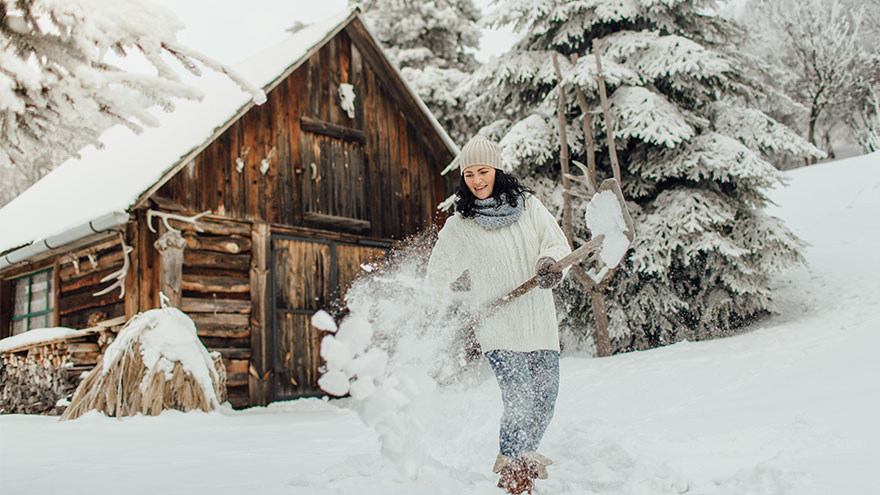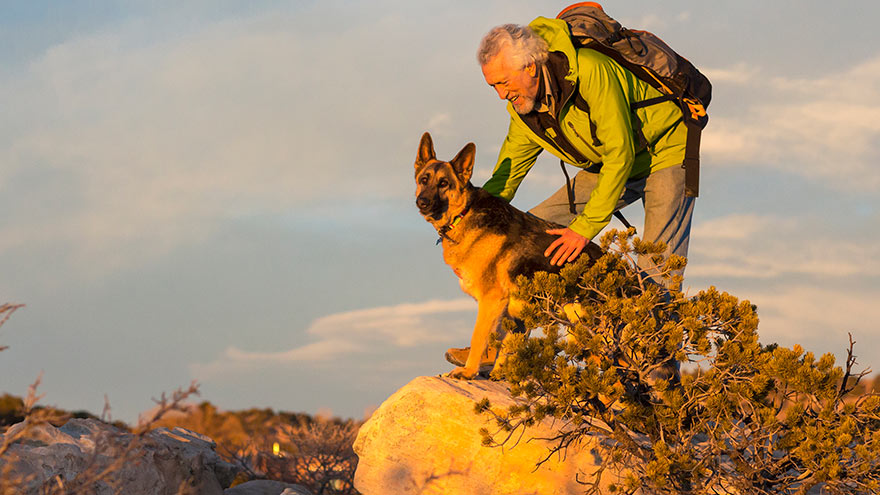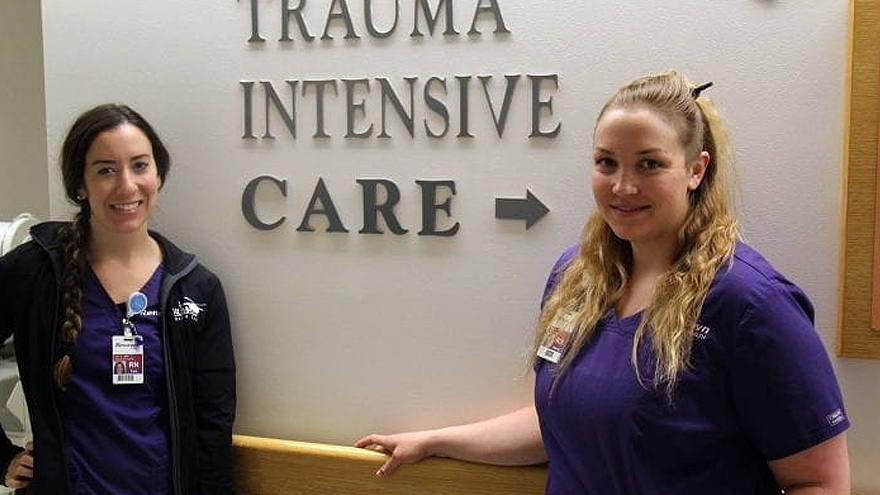Buscar
-
6 consejos para palear la nieve de manera segura
While the appearance of a winter wonderland in your yard can be a welcome one, an accompanying aspect is not: the idea of clearing your driveway and sidewalks. The sometimes-daunting task of snow shoveling is a repetitive activity that can cause muscle strain to the lower back and shoulders. However, by following the tips below, you will spend more time appreciating your winter wonderland -- when your sidewalk and driveway are all clear, that is. But, we all know that injuries happen, and if you do find yourself with back pain that does not resolve in a few days, contact your primary healthcare provider, or visit a Renown Urgent Care. Another way to avoid injury during strenuous activity, or help heal an injury that won't go away, is to work with a physical therapist who can offer at-home exercises to keep your body strong. 6 Tips for Safe Snow Shoveling Following these tips from the American Physical Therapy Association can help you avoid injuries: Lift smaller loads of snow, rather than heavy shovelfuls. Be sure to bend your knees and lift with your legs, rather than your back. Use a shovel with a shaft that lets you keep your back straight while lifting. A short shaft will cause you to bend more to lift the load. Using a shovel that’s too long makes the weight at the end heavier. Step in the direction where you are throwing the snow to prevent the low back from twisting to help prevent “next-day back fatigue.” Avoid excessive twisting because the spine cannot tolerate this motion. Bend your knees and keep your back as straight as possible so that you are lifting with your legs. Take frequent breaks when shoveling. Stand up straight and walk around periodically to extend the lower back. Backward bending exercises while standing will help reverse the excessive forward bending of shoveling. Stand straight and tall, place your hands toward the back of your hips and bend slightly backward for several seconds. When in doubt, ask for help. The Reno community is a generous one and you can typically find snow shovelers for hire on local message boards like Nextdoor and Facebook. Or, if you have a kid in your neighborhood, they might be looking to make some extra money on a snow day.
-
Emergency Hiking Kit Essentials
With the help of Aaron Bertalmio, MD of Renown Urgent Care, we're sharing nine essential must-have items for your hiking emergency kit. 9 Essential Items For Your Hiking Emergency Kit With more than 300 days of sunshine in Reno-Tahoe and plenty of trails to explore, you'll want to keep these essential items in your kit. 1. Water Surprisingly, this no-brainer, however, is often overlooked. Bring enough water to last for the entire adventure. This amount of water can be heavy depending on the distance, altitude or intensity. With this in mind, the next best bet is to filter or purify water from a lake or stream. Here's how: You can do this with iodine or chlorine dioxide tablets, charcoal or an ultraviolet light wand. Tip: Look for water that is moving or rushing over rocks. Having enough water or filtration cannot be underestimated. "If you become injured and need to wait for help, you can only last about three days without water," Dr. Bertalmio says. 2. Food Meals-Ready-to-Eat (MREs) or dehydrated food pouches are essential, ensuring you have plenty to eat if you're outdoors longer than expected. 3. Maps Bring a printed map, compass or GPS. You can't always rely on your smartphone, so this is the perfect backup plan. 4. First-Aid Supplies Your hiking first-aid kit should change based on the type of hiking. As a basic rule, keep the following items in your pack: Fever/pain reliever Sewing kit with safety pins Tweezers Bandages and moleskin Antibiotic ointment Duct or medical tape Whistle 5. Light Source Wear or pack a small headlamp to illuminate the way if you get caught outside after sunset or in a poorly lit area. Headlamps are also great in emergencies because they are hands-free. 6. Emergency Shelter Even if you're only going out for the day, pack a low-weight emergency blanket for the trip. In other words, if the day trip turns into an overnight adventure, the blanket will keep you warm and alive in the event of cold temperatures. 7. Fire Starter Pack small tools in your hiking emergency kit to ensure an easy fire start. Waterproof matches, a knife, a lighter, or a strike fire starter are great options. Tip: Bring a multi-tool, including a knife and scissors that can be used for first-aid. 8. Layers of Clothing Mother Nature likes to change her mind in northern Nevada, and temperatures vary significantly within 24 hours. Therefore, pack a compact, lightweight waterproof and windproof jacket. This will protect you from being uncomfortably chilly and experiencing hypothermia. "Hypothermia is when your body temperature drops to a dangerously low level. You want to avoid this completely by keeping body temperature regulated outdoors and avoiding cold water immersion," says Dr. Bertalmio. 9. Sun Protection Certainly, sun protection should be part of your daily routine and an essential in your hiking emergency kit. You'll want to bring enough sunblock to reapply in direct sunlight and layers to cover exposed skin every two hours. Dr. Bertalmio reminds everyone the sun is intense in northern Nevada. "The higher altitude means an increased risk of sun-induced skin damage," he explains. "Some trails can reach above 10,000 feet, and at that altitude, UV radiation could be 35 to 45 percent more intense than at sea level."
-
Celebrating Renown Health's Nursing Excellence Conference
Renown Health recently wrapped up the twentieth annual Nursing Excellence and Excellence in Critical Care Conferences, the conference theme was the Courageous Calling and over 400 nurses from specialty fields across the region attended to learn, reflect, build relationships and obtain continuing education units (CEUs). Celebrating The Courageous Calling During the first day of the Nursing Excellence Conference, local and national leaders presented topics including redefining resilience, documentation liability, transgender healthcare and caring for the homeless population. Among the list of impressive speakers were Chief Nurse Executive at Renown Health, Melodie Osborn, and Nora McInerny, writer and host of the "Terrible Thanks for Asking" podcast. On day two,speakers focused on the critical care specialties within nursing, including intensive care, emergency room, pediatric intensive care and neonatal intensive care. Topics covered included post-COVID-19 pulmonology with Dr. Graham, traumatic brain injuries with Dr. Demers, COVID-19 reflections with Anicia Beckwith, a discussion about "Mis C” with Dr. Healy, innovations in imaging with Dr. Rangaswamy and cardiology with Dr. Danaf. Thank you to our sponsors and raffle donors for making this event possible: Erik Olson and Larry Duncan, Jana Elliott, Melodie Osborn, Becky Haase, Lori Tuntland, Dr. Akbar, Dr. Lous, Mel Morris, Grand Sierra Resort, Renown Health Gift Shops, Renown Health Directors of Nursing, Renown Health Marketing & Communications Department, Renown Health Dermatology, Laser, & Skin Care and Renown Health Foundation. Learn more about finding purpose in the health of our community when working at Renown Health here.
Read More About Celebrating Renown Health's Nursing Excellence Conference
-
Enfrentar la amenaza de la violencia laboral en los hospitales
In recent years, workplace violence against healthcare workers has been on the rise. According to the Occupational Safety and Health Administration (OSHA), about 75 percent of nearly 25,000 reported annual workplace assaults occur in healthcare and social service settings. Those who don’t work in healthcare may be surprised to learn that violent altercations are so common in our field. Hospital settings can create fear and stress for patients and their families. Pain, mind-altering medications and drugs, and difficult prognoses can amplify these feelings. While inappropriate responses may be understandable, violence cannot be tolerated. As the leader of a health system, protecting our employees is an issue that I take seriously. Reporting Workplace Violence Unfortunately, sometimes employees don’t report dangerous incidents fearing they might be blamed, or not realizing it’s a reportable offense. At Renown Health, we take these events seriously. We have clear, mandatory policies and protocols for reporting and investigating violent incidents. Each incident is investigated to ensure follow through and accountability. We also teach de-escalation skills to our hospital security teams, clinicians, and other frontline employees. As an added layer of protection, Renown Health has a first-rate security team that closely monitors activity on our campuses, addressing potential issues before they escalate. Our organization values our partnerships with community organizations including local law enforcement agencies like the Washoe County Sheriff’s Office and the Reno Police Department. Renown Health maintains a close relationship with these partners, and we alert them when our care teams experience an increase in violent incidents. I also recognize that workplace violence is a national problem that demands collaborative solutions. That’s why I am also proud to serve as a member of the American Hospital Association’s Hospitals Against Violence Advisory Committee. Nurses, doctors, paramedics, and frontline health workers care for us every day. It’s our responsibility to support them by ensuring they feel safe at work.
Read More About Addressing the Threat of Workplace Violence in Hospitals
-
The Journey Within: Helping Others Through Grief
Learn more about a Renown Health nurse who formed a nonprofit to help other families through loss. After the unexpected loss of her young husband, a Renown Health nurse turned her grief into helping other families navigate the loss of a family member. Jen Walker, RN, MSN, director of clinical excellence, lost her high school sweetheart and husband of eight years when he passed away in October 2015, while their two boys, age 7 and 9, lost their father. Walker, a nurse at Renown since 2003, was overwhelmed by the outpouring of support she received from the Reno community. It inspired her to want to help others in the same situation. “After Travis passed, the community did some amazing things for me,” Walker says. “I got really motivated to do the same thing and to give back, so that’s when I came up with starting The Journey Within.” The Journey Within organization provides support and resources for young families who have lost a close family member. Before officially starting her organization, Walker used some of the money she received after her husband passed and personally donated to three families. And with the help of four board members, Jen officially started The Journey Within in February 2017, and they have helped six families so far. One of the board members is her sister, Anny Goff. “She thought of creating this foundation in the darkest time of her family’s life,” Goff says. “She knew there would be other families that would need help and support and immediately wanted to help others. It showed incredible strength and courage to keep moving forward.” Nursing Careers at Renown Health Nurses at Renown Health demonstrate a commitment to patients and their families through the integration of care, clinical expertise, education, evidence-based practice and the pursuit of quality patient outcomes. Learn more about our mission, vision and values and the benefits of a career in nursing at Renown Health today. Explore Nursing at Renown Walker’s organization supports families through financial donations, which she funds through two yearly fundraisers. The Travy Tourney is a golf tournament held in memory of Travis, and the “Let’s Toast to Travis Fundraiser” event raffles prizes and merchandise. Along with financial support, The Journey Within helps families connect with other community resources, such as counseling and grief therapy services. Walker hopes to expand her nonprofit’s fundraising and support for families beyond the Reno-Tahoe community. Because of her outstanding work at Renown and in the community, Walker recently received a 20 Under 40 award from the Reno-Tahoe Young Professionals Network. She has also received a Women of Achievement award, a Leader of the Quarter award and has been nominated four times for Northern Nevada Nurses of Achievement. “She is strong and resilient and cares a lot about people,” says Jen Richards, chief nursing officer, acute care services. “She never settles for the status quo and is always pushing our team to do better.” In navigating her own loss and starting a nonprofit to give back, Walker has learned a lot about the community. “I’ve gained a tremendous amount of respect for the community as a whole, but especially for the young community,” she says. “Seeing the young people in the community who have been willing to give back and live really selflessly has been amazing to me.” As someone who lost her husband, helping young families who have gone through the loss of a close loved one can hit close to home for Walker, but that doesn’t stop her — it fuels her. “That’s one of the hardest parts about doing this — it takes you back a little bit,” she says. “But it’s just a very good reminder of ‘why.’ Because when I get to talk with these families, I realize that now I am that person who is there to listen. I just want them to know that they’re talking to someone who’s been through something similar.”
Read More About The Journey Within: Helping Others Through Grief
-
Caring for the Whole Family: Renown Nurse Helps Patient with Ailing Pet
Registered Nurse Tori Tembey (left) shared how her co-worker and fellow RN Jennifer Payne helped a patient with his pet's end-of-life arrangements. "It was such a selfless act that Jennifer took the time to do this for the patient.” Tembey says. Pets become members of our own family, and when they are ill or at the end of their lives, it can be devastating for their owners. During a hospital stay, a Renown patient was faced with the difficult decision to euthanize their terminally ill pet. A Renown registered nurse stepped in to help in some pretty remarkable ways. Back in high school, Jennifer Payne wanted to be a veterinarian. She worked in a veterinary hospital and planned to attend veterinary school, but struggled with some of the situations she faced. “I have a lot of compassion for animals,” Payne explains. “And some of the things I saw while working at the vet — like people bringing in their cat saying, ‘I’m moving, you need to put this cat down’ — wasn’t OK with me, and wasn’t what I wanted to do.” She changed course and went into nursing, but recently drew upon her early experiences working with pets and their owners to help a Renown patient in an extraordinary way. Payne now works in the trauma intensive care unit at Renown Regional Medical Center, where she recently observed a county animal control officer visiting a patient. The patient was visibly upset — they learned their dog was terminally ill and in poor health, and a veterinarian was recommending euthanasia. The patient had lost another dog just before Christmas. The patient hoped to have his ill dog similarly cremated, but animal control does not perform cremation. “I overheard all of this and thought, ‘this is the most horrible thing I’ve ever heard,’” Payne says. She offered to pick up the dog, have him cremated and bring the ashes to the patient. She also took up a collection with her Renown colleagues to pay for the cremation. The next day — her day off — Payne and her young daughter picked up the ashes and brought them to the patient at the hospital. “He couldn’t even talk because he was crying so much,” Payne says. “He said ‘I can’t thank you enough for all you’ve done. You’re a wonderful person.’ There was a friend in the room who asked what my daughter’s name was, and I said ‘Estelle.’ The friend said, ‘Estelle, your mother is an angel.’” Payne, who has a golden retriever of her own, says she knows what it’s like to have “fur babies,” and she could see how important this dog was to the patient. “It was great to be able to do this for him,” she says. Renown salutes nurses like Jennifer Payne, who are making a genuine difference everyday in the lives of patients and in the community.
Read More About Caring for the Whole Family: Renown Nurse Helps Patient with Ailing Pet





